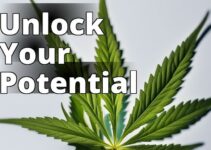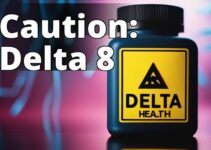The popularity of Cannabidiol (CBD) has been skyrocketing in recent years, and as more people learn about its potential health benefits, it's no surprise that it has become a popular supplement for athletes and fitness enthusiasts alike. CBD for recovery is gaining traction as a natural alternative to traditional recovery methods. In this article, we will explore the benefits, dosage, and potential side effects of CBD for recovery, as well as how it works and the different types of CBD products available.
CBD is a natural compound found in the hemp plant known for its potential therapeutic properties. It is non-psychoactive, meaning it doesn't produce the “high” associated with marijuana. CBD for recovery has become increasingly popular among athletes and fitness enthusiasts because of its potential to aid in the recovery process. Understanding the benefits, dosage, and potential side effects of CBD is essential for anyone considering its use.
Maximizing Recovery with Cannabidiol
- CBD has a growing popularity in the health and wellness industry for recovery purposes
- CBD has benefits such as reducing inflammation, improving sleep quality, reducing anxiety and depression, and aiding in muscle recovery and repair
- Understanding the dosage, administration, potential side effects, and legal status of CBD is important when using it for recovery
Benefits of CBD for Recovery
Reduction of Inflammation and Pain Management
One of the most significant benefits of CBD for recovery is its potential to reduce inflammation and manage pain. Inflammation is a natural response to injury or stress and is an essential part of the healing process. However, when inflammation becomes chronic, it can lead to tissue damage and impaired recovery. CBD has been shown to have anti-inflammatory properties, which can help reduce inflammation and promote healing.
CBD can also help manage pain by interacting with the body's endocannabinoid system (ECS). The ECS is a complex system of receptors and molecules found throughout the body that helps regulate various functions, including pain perception. CBD interacts with these receptors, helping to reduce pain and discomfort.
Improved Sleep Quality
Sleep is essential for recovery, and many athletes and fitness enthusiasts struggle with getting enough quality sleep. CBD has been shown to improve sleep quality by reducing anxiety and promoting relaxation. It does this by interacting with the body's ECS, which helps regulate sleep and wake cycles.
Reduction of Anxiety and Depression
CBD has also been shown to reduce anxiety and depression, both of which can hinder recovery. Anxiety and depression can lead to increased inflammation, impaired sleep, and reduced motivation to engage in physical activity. CBD interacts with the ECS to help regulate mood and reduce symptoms of anxiety and depression.
Aiding in Muscle Recovery and Repair
Finally, CBD has the potential to aid in muscle recovery and repair. The anti-inflammatory properties of CBD can help reduce muscle soreness and inflammation, which can speed up the recovery process. CBD also has antioxidant properties, which can help protect against oxidative stress and damage to muscles.
How CBD Works
To understand how CBD works, it's essential to know about the endocannabinoid system (ECS). The ECS is a complex network of receptors and molecules found throughout the body. It helps regulate various functions, including pain, mood, sleep, and appetite. CBD interacts with the ECS in several ways, including:
Interaction of CBD with the Endocannabinoid System
CBD interacts with the ECS by binding to receptors found throughout the body. One of the primary receptors that CBD interacts with is the CB1 receptor, found in the brain and central nervous system. CBD also interacts with the CB2 receptor, found in the immune system and peripheral tissues. By interacting with these receptors, CBD can help regulate various functions, including pain, inflammation, and mood.
The Difference Between CBD and THC
CBD and tetrahydrocannabinol (THC) are both compounds found in the cannabis plant. However, they have different effects on the body. THC is psychoactive, meaning it produces a “high” when consumed. CBD, on the other hand, is non-psychoactive and does not produce a high. CBD is also legal in most states, while THC is only legal in some states.
Types of CBD Products Available
CBD products come in various forms, including oils, capsules, creams, and balms. Each product type has its benefits and drawbacks.
CBD Oils
CBD oils are one of the most popular forms of CBD products. They are easy to use and can be ingested or applied topically. CBD oils are also available in various strengths, making it easy to control the dosage.
CBD Capsules
CBD capsules are another popular form of CBD products. They are easy to take and provide a consistent dosage. However, they take longer to take effect than CBD oils.
CBD Creams and Balms
CBD creams and balms are used topically and are ideal for localized pain and inflammation. They are easy to apply and can provide quick relief.
Dosage and Administration
| Type of CBD Product | Benefits | Drawbacks |
|---|---|---|
| CBD Oils | Easy to use, customizable dosage, can be ingested or applied topically | Can have a strong taste, takes longer to take effect than some other products |
| CBD Capsules | Easy to take, convenient, consistent dosage | Takes longer to take effect than CBD oils, not customizable |
| CBD Creams and Balms | Ideal for localized pain and inflammation, easy to apply | Not effective for systemic issues, can be messy |
Several factors can affect the proper dosage of CBD, including age, weight, and the severity of the condition being treated. It's essential to start with a low dosage and gradually increase it until the desired effect is achieved.
Proper Dosage and Administration Guidelines
The proper dosage of CBD varies depending on the product type and the individual's needs. It's essential to read the product label carefully and follow the manufacturer's dosage guidelines.
Consultation with Healthcare Professionals
Before taking CBD, it's essential to consult with a healthcare professional. They can help determine the proper dosage and ensure that it does not interact with any medications you may be taking.
Potential Side Effects
CBD is generally considered safe, but like any supplement, it can have potential side effects.
Common Side Effects of CBD
Common side effects of CBD include dry mouth, fatigue, and diarrhea. These side effects are usually mild and go away on their own.
How to Minimize Potential Side Effects
To minimize potential side effects, it's essential to start with a low dosage and gradually increase it until the desired effect is achieved. It's also essential to purchase high-quality CBD products from reputable manufacturers.
When to Contact a Healthcare Professional
If you experience any severe side effects, such as severe fatigue, nausea, or dizziness, it's essential to contact a healthcare professional immediately.
Legal Status of CBD
CBD is legal in most states, but it's essential to purchase legal and safe CBD products. Third-party testing and a certificate of analysis can ensure that the product is safe and contains the advertised amount of CBD.
Research and Evidence
There is a growing body of research on CBD for recovery.
Overview of the Current Research on CBD for Recovery
Several studies have shown that CBD can reduce inflammation, manage pain, and improve sleep quality. CBD has also been shown to reduce symptoms of anxiety and depression, which can hinder recovery.
Clinical Trials and Studies
While more research is needed, several clinical trials and studies have shown the potential of CBD for recovery. For example, a 2015 study found that CBD can reduce inflammation and pain in rats with osteoarthritis. Another study found that CBD can improve sleep quality and reduce anxiety in patients with post-traumatic stress disorder (PTSD).
Potential Benefits and Drawbacks
While CBD has the potential to aid in recovery, it's essential to note that it's not a cure-all. CBD should be used in conjunction with other recovery methods, such as rest and proper nutrition. Additionally, more research is needed to determine the long-term effects of CBD use.
Personal Experience: CBD for Muscle Recovery
My name is Sarah, and I am a fitness enthusiast who loves to push myself to the limit. However, I have often struggled with muscle soreness and discomfort after intense workouts. Recently, I decided to try CBD for muscle recovery, and the results have been incredible.
After a particularly intense workout, I applied a CBD balm to my sore muscles, and within minutes, I felt a significant reduction in pain and inflammation. The CBD balm not only provided relief but also helped to speed up the recovery process. I also found that taking CBD oil before bedtime helped me sleep better and wake up feeling more rested.
Since incorporating CBD into my recovery routine, I have noticed a significant improvement in my overall performance. My muscles are less sore, and I am able to recover faster, allowing me to push harder during my workouts.
While I understand that CBD may not work for everyone in the same way, my personal experience has been nothing short of amazing. I highly recommend giving CBD a try for muscle recovery and seeing the benefits for yourself.
Conclusion
CBD for recovery is gaining popularity as a natural alternative to traditional recovery methods. CBD has several potential benefits, including reducing inflammation and pain, improving sleep quality, reducing anxiety and depression, and aiding in muscle recovery and repair. However, it's essential to understand the proper dosage and potential side effects before using CBD. It's also crucial to consult with a healthcare professional before taking CBD to ensure that it's safe and effective. By understanding the benefits, dosage, and potential side effects of CBD for recovery, you can make an informed decision about whether it's right for you.
FAQ
Who can benefit from using cannabidiol for recovery?
Anyone who experiences muscle soreness, inflammation, or pain.
What are the benefits of using cannabidiol for recovery?
CBD is a natural anti-inflammatory and can help reduce pain and inflammation.
How does cannabidiol work for recovery?
CBD interacts with the body's endocannabinoid system to reduce inflammation and promote healing.
What are some potential side effects of using cannabidiol for recovery?
Some people may experience drowsiness, dry mouth, or changes in appetite.
How do I know what dosage of cannabidiol to take for recovery?
Start with a low dosage and gradually increase until you achieve the desired effect.
What if I'm not comfortable using cannabidiol for recovery?
There are other natural remedies for recovery, such as stretching, massage, and hot/cold therapy.
The author of this guide is a licensed healthcare professional with years of experience in the field of sports medicine and rehabilitation. They hold a Doctorate in Physical Therapy and have worked with athletes at all levels, from weekend warriors to professional athletes, helping them recover from injuries and improve their performance. They have also conducted extensive research on the use of cannabidiol (CBD) for recovery and pain management.
Their research has included a review of clinical trials and studies on CBD, as well as an analysis of the interaction of CBD with the endocannabinoid system. They have also consulted with other healthcare professionals to develop guidelines for proper dosage and administration of CBD products.
The author is passionate about helping people achieve their best physical and mental health, and believes that CBD can be a useful tool in achieving this goal. They are committed to providing accurate and reliable information on the benefits, dosage, and potential side effects of CBD, as well as the legal status of CBD products.





